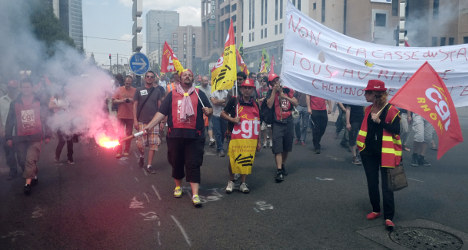'Pilots' strike shows how France cannot reform'

"All French people are a little like Air France pilots". This is the view of French Economy expert Nicolas Bouzou, who argues that the crippling Air France pilots' strike is representative of a country that appears incapable of reform.
The Air France pilots’ strike has only added to the already poisonous economic and social climate in France.
And as usual a scapegoat has been found. This time it’s the pilots who are seen as privileged and irresponsible. The accusation of privilege, which is brandished every time someone earns a little money, borders on stupidity.
Privileges offer protection and Air France pilots put their careers in the balance every six months, through the obligatory doctors' visits and other checks.
The issue here is not the tens of millions of euros the strike is costing. It is that the strike has given us a great opportunity to try out other airlines that offer excellent value for money.
From now on, we no longer automatically choose to fly with Air France. This break in loyalty is tragic for a company which is barely recovering financially.
But that’s not the point.
Swiss Air has disappeared but Switzerland the country is doing just fine.
The problem is that Air France reflects our collective behaviour. Air France, like France itself, is suffering a crisis as it adapts to globalization.
Air France, like France itself, is suffering from delayed reforms. Air France, like France, is suffering from a breach of trust between management (or in France’s case, the government) and its employees (or citizens).
The process of the liberalization of air transport began in Europe in the 1980s. Today the competition in the industry is intense. The shock of global competition, as always, had a positive impact on employment and business activity in the sector.
SEE ALSO: 'Don't believe the Economist - France has been reforming'

'The longer we wait to reform the more painful it is'
However it also resulted in harsh redistributive effects in favour of the new players in the market.
Consider this: Air France flies fewer than 150 aircraft on short or medium-haul flights compared to 200 for EasyJet and 300 for RyanAir. Air France should have adapted ten years ago by developing a low cost brand as well as a range for business travellers. But it didn’t.
Today it seems management is trying desperately to catch up by developing the subsidiary Transavia Europe in Portugal, a country more attractive than France (It’s not hard) for businesses in terms of labour costs and employment laws.
The pilots don’t want to hear anything about something which is effectively outsourcing. Public opinion is hard on the strikers, but nobody likes to see his company relocate part of its production, even when it’s necessary.
The reaction of the pilots is passionate, if not completely intelligent, just like factory workers reacting to the closure of their plant in France.
There is a general lesson we can take from this – the longer we wait to make reforms, the more painful they are to bear.
Conservatives of all kinds, those who tell us that public education and the justice system works well and is in no need of reform, should remind themselves of this.
The bosses of Air France seem to have lost the confidence of the pilots. If we look at the impact of the strike, there were not 50 or 60 percent of Air Flights grounded in recent days as was claimed, but more like 80 percent.
The difference between these figures is that other companies have helped cover many of Air France's scheduled flights.
Pilots have criticized management for not respecting certain agreements that were signed by both parties over the development of Transavia, which is true.
Management has carried out a U-turn, just like President François Hollande played down the crisis before discovering the virtues of spending cuts and competitiveness.
It seems to me that Air France wants to separate Transavia from Air France because it doesn’t want to contaminate the subsidiary with the same financial and social working conditions in place at Air France that are deemed too beneficial in today’s competitive market.
Why not, if that is the remedy that is required?
But at least have the courage to say so face to face, just like the French are entitled to know how we will find €50 billion to reduce public spending, which is a worthy goal in itself.
The government, a minority shareholder of the company, is exacerbating the situation. In seeking social peace it has backed the management of Air France, but has not explained to our citizens the challenges ahead.
The pilots have the same view towards their management as the French do towards their government.
They are almost certainly conservative, regret there have not been more reforms in the past and blame their management, who are desperately trying to play catch-up, without being clear or sticking to the promises they made.
In fact, we are all a little bit like the Air France pilots.
Nicolas Bouzou is an essayist, who specializes in the field of economics. He was the head of the financial forecast institute Xerfi for six years and now runs his own company Asteres - which specializes in financial consulting and analysis.
This opinion piece first appeared in France's Le Figaro newspaper. To read the original you can click here.
Comments
See Also
The Air France pilots’ strike has only added to the already poisonous economic and social climate in France.
And as usual a scapegoat has been found. This time it’s the pilots who are seen as privileged and irresponsible. The accusation of privilege, which is brandished every time someone earns a little money, borders on stupidity.
Privileges offer protection and Air France pilots put their careers in the balance every six months, through the obligatory doctors' visits and other checks.
The issue here is not the tens of millions of euros the strike is costing. It is that the strike has given us a great opportunity to try out other airlines that offer excellent value for money.
From now on, we no longer automatically choose to fly with Air France. This break in loyalty is tragic for a company which is barely recovering financially.
But that’s not the point.
Swiss Air has disappeared but Switzerland the country is doing just fine.
The problem is that Air France reflects our collective behaviour. Air France, like France itself, is suffering a crisis as it adapts to globalization.
Air France, like France itself, is suffering from delayed reforms. Air France, like France, is suffering from a breach of trust between management (or in France’s case, the government) and its employees (or citizens).
The process of the liberalization of air transport began in Europe in the 1980s. Today the competition in the industry is intense. The shock of global competition, as always, had a positive impact on employment and business activity in the sector.
SEE ALSO: 'Don't believe the Economist - France has been reforming'

'The longer we wait to reform the more painful it is'
However it also resulted in harsh redistributive effects in favour of the new players in the market.
Consider this: Air France flies fewer than 150 aircraft on short or medium-haul flights compared to 200 for EasyJet and 300 for RyanAir. Air France should have adapted ten years ago by developing a low cost brand as well as a range for business travellers. But it didn’t.
Today it seems management is trying desperately to catch up by developing the subsidiary Transavia Europe in Portugal, a country more attractive than France (It’s not hard) for businesses in terms of labour costs and employment laws.
The pilots don’t want to hear anything about something which is effectively outsourcing. Public opinion is hard on the strikers, but nobody likes to see his company relocate part of its production, even when it’s necessary.
The reaction of the pilots is passionate, if not completely intelligent, just like factory workers reacting to the closure of their plant in France.
There is a general lesson we can take from this – the longer we wait to make reforms, the more painful they are to bear.
Conservatives of all kinds, those who tell us that public education and the justice system works well and is in no need of reform, should remind themselves of this.
The bosses of Air France seem to have lost the confidence of the pilots. If we look at the impact of the strike, there were not 50 or 60 percent of Air Flights grounded in recent days as was claimed, but more like 80 percent.
The difference between these figures is that other companies have helped cover many of Air France's scheduled flights.
Pilots have criticized management for not respecting certain agreements that were signed by both parties over the development of Transavia, which is true.
Management has carried out a U-turn, just like President François Hollande played down the crisis before discovering the virtues of spending cuts and competitiveness.
It seems to me that Air France wants to separate Transavia from Air France because it doesn’t want to contaminate the subsidiary with the same financial and social working conditions in place at Air France that are deemed too beneficial in today’s competitive market.
Why not, if that is the remedy that is required?
But at least have the courage to say so face to face, just like the French are entitled to know how we will find €50 billion to reduce public spending, which is a worthy goal in itself.
The government, a minority shareholder of the company, is exacerbating the situation. In seeking social peace it has backed the management of Air France, but has not explained to our citizens the challenges ahead.
The pilots have the same view towards their management as the French do towards their government.
They are almost certainly conservative, regret there have not been more reforms in the past and blame their management, who are desperately trying to play catch-up, without being clear or sticking to the promises they made.
In fact, we are all a little bit like the Air France pilots.
Nicolas Bouzou is an essayist, who specializes in the field of economics. He was the head of the financial forecast institute Xerfi for six years and now runs his own company Asteres - which specializes in financial consulting and analysis.
This opinion piece first appeared in France's Le Figaro newspaper. To read the original you can click here.
Join the conversation in our comments section below. Share your own views and experience and if you have a question or suggestion for our journalists then email us at [email protected].
Please keep comments civil, constructive and on topic – and make sure to read our terms of use before getting involved.
Please log in here to leave a comment.